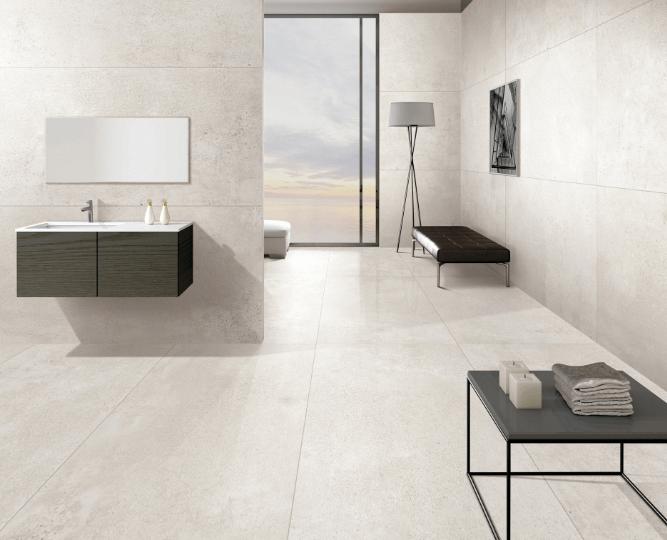When you make a comparison between porcelain tile and ceramic tile, you may have a series of questions about ceramic tiles. You may afraid of making a bad decision on the selection of the tiles. In this post, the author would solve the frequently asked questions about ceramic tiles.
Is Ceramic Tile A Natural Stone?
No, ceramic tile is not a natural stone tile. Ceramic tiles are made from clay that has been molded and fired at high temperatures, while natural stones such as granite, marble, limestone, travertine, slate, and sandstone are formed from geological processes over millions of years.
However, ceramic tiles can be made to mimic the look of natural stone and are a popular choice for flooring and walls in homes and commercial buildings.
And, if the water sneaks through the grout or cracks in the tile, it can still damage the underlying materials. Therefore, it's important to maintain the integrity of the grout and sealant to ensure the long-term waterproofing of ceramic tiles.
However, ceramic tiles can be made to mimic the look of natural stone and are a popular choice for flooring and walls in homes and commercial buildings.
And, if the water sneaks through the grout or cracks in the tile, it can still damage the underlying materials. Therefore, it's important to maintain the integrity of the grout and sealant to ensure the long-term waterproofing of ceramic tiles.
Is Ceramic Tile Porous?
Ceramic tile can be porous or non-porous depending on its manufacturing process and finish. Non-porous ceramic tiles are typically coated with a glaze that makes them impermeable to liquids, while porous ceramic tiles are left unglazed, which allows them to absorb water and other liquids. With the porous structure, the unglazed ceramic tile is often used for their natural, earthy look, but they require more maintenance and can be more prone to staining than non-porous ceramic tiles.
Is Ceramic Tile Waterproof?
Ceramic tiles are not completely waterproof, but they are highly water-resistant. When installed correctly with appropriate sealant and grout, ceramic tiles can effectively prevent water from penetrating to the subfloor or wall behind them, making them a popular choice for bathrooms, kitchens, and other wet areas. However, it's important to note that if water is allowed to seep through the grout or cracks in the tile, it can still damage the underlying materials. Therefore, it's important to maintain the integrity of the grout and sealant to ensure the long-term waterproofing of ceramic tiles.
Is Ceramic Tile Eco Friendly?
Ceramic tiles can be eco-friendly depending on how they are manufactured and sourced. Some ceramic tiles are made from recycled materials, such as crushed glass or post-consumer waste, which can reduce the environmental impact of their production.
Additionally, ceramic tiles are durable and long-lasting, which means they can help reduce the need for frequent replacements and waste.
However, the production of ceramic tiles typically involves the use of non-renewable resources and can generate greenhouse gas emissions, making it important to choose manufacturers that prioritize sustainable practices and materials.
Then, there is one thing you need to know the installation of ceramic tiles may require the use of adhesives and sealants that can contain potentially harmful chemicals. Then, you need to choose low-VOC options to minimize environmental impact.
However, the production of ceramic tiles typically involves the use of non-renewable resources and can generate greenhouse gas emissions, making it important to choose manufacturers that prioritize sustainable practices and materials.
Then, there is one thing you need to know the installation of ceramic tiles may require the use of adhesives and sealants that can contain potentially harmful chemicals. Then, you need to choose low-VOC options to minimize environmental impact.
Are Ceramic Tiles Fire Resistant?
Ceramic tiles are fire-resistant and are a popular choice for use in fireplaces and other areas where high temperatures may be present. Ceramic tiles are made by firing clay at high temperatures, which makes them highly resistant to heat and flame.
In fact, ceramic tiles can withstand temperatures of up to 2,500 degrees Fahrenheit without melting or burning. This makes them an excellent choice for use in areas where fire protection is a concern, such as kitchens, bathrooms, and commercial buildings.
In fact, ceramic tiles can withstand temperatures of up to 2,500 degrees Fahrenheit without melting or burning. This makes them an excellent choice for use in areas where fire protection is a concern, such as kitchens, bathrooms, and commercial buildings.
Are Ceramic Tiles Heat Resistant?
Ceramic tiles are heat-resistant, but the degree of heat resistance can vary depending on the type of ceramic tile and its manufacturing process. Generally, ceramic tiles can withstand high temperatures without melting or warping, which makes them a popular choice for use in areas that are exposed to heat, such as kitchens and fireplaces.
However, it's important to note that extreme and prolonged exposure to heat can cause ceramic tiles to crack or discolor over time, so it's important to choose tiles that are specifically designed for high-heat applications and to follow proper installation and maintenance guidelines.
However, it's important to note that extreme and prolonged exposure to heat can cause ceramic tiles to crack or discolor over time, so it's important to choose tiles that are specifically designed for high-heat applications and to follow proper installation and maintenance guidelines.
By the way, although the ceramic tiles themselves may be heat-resistant, the underlying materials and adhesives used in their installation may not be. Therefore, it is essential to consult with a professional to ensure proper safety measures are in place.
Can Ceramic Tiles Be Polished?
Yes, ceramic tiles can be polished, but the degree of polish that can be achieved will depend on the type of ceramic tile and its finish. The glazed ceramic tile that has a glazed finish are not typically polished, as the glaze provides a protective coating that doesn't require further treatment.
However, unglazed ceramic tiles can be polished to create a shiny, reflective surface. Polishing ceramic tiles involves using a series of progressively finer grits of abrasive pads to remove the surface layer of the tile and create a smooth, polished finish. It's important to note that polishing unglazed ceramic tiles can make them more susceptible to staining and wear, so it's important to follow proper maintenance and care guidelines to keep the tiles looking their best.
However, unglazed ceramic tiles can be polished to create a shiny, reflective surface. Polishing ceramic tiles involves using a series of progressively finer grits of abrasive pads to remove the surface layer of the tile and create a smooth, polished finish. It's important to note that polishing unglazed ceramic tiles can make them more susceptible to staining and wear, so it's important to follow proper maintenance and care guidelines to keep the tiles looking their best.
Is Ceramic Tile Durable?
Yes, ceramic tiles are durable and can last for many years with proper installation and maintenance. Ceramic tiles are made from a mixture of clay, minerals, and water, which is then fired at high temperatures to create a hard, dense material that is resistant to wear and tear.
Ceramic tiles are highly scratch-resistant, and they can withstand heavy foot traffic without showing signs of wear. Additionally, ceramic tiles are resistant to moisture, stains, and odors, which makes them a popular choice for use in bathrooms, kitchens, and other areas that are exposed to water and spills.
However, it's important to note that while ceramic tiles are durable, they can still crack or chip if they are subjected to heavy impact or extreme temperature changes, so it's important to follow proper installation and maintenance guidelines to ensure their longevity.
Ceramic tiles are highly scratch-resistant, and they can withstand heavy foot traffic without showing signs of wear. Additionally, ceramic tiles are resistant to moisture, stains, and odors, which makes them a popular choice for use in bathrooms, kitchens, and other areas that are exposed to water and spills.
However, it's important to note that while ceramic tiles are durable, they can still crack or chip if they are subjected to heavy impact or extreme temperature changes, so it's important to follow proper installation and maintenance guidelines to ensure their longevity.
Is Ceramic Tile Dust Dangerous?
When ceramic tiles are cut or drilled, they can create dust that contains crystalline silica, which can be harmful if inhaled in large quantities over an extended period of time. Breathing in silica dust can cause respiratory issues, such as lung cancer and silicosis, which is a chronic lung disease.
To minimize the risk of exposure to silica dust, it's important to use proper safety equipment, such as a dust mask and safety glasses, when cutting or drilling ceramic tiles.
Additionally, it's important to clean up any dust or debris generated during the cutting process promptly and to dispose of it properly. With proper safety measures in place, the risk of exposure to harmful dust from ceramic tiles can be minimized.
To minimize the risk of exposure to silica dust, it's important to use proper safety equipment, such as a dust mask and safety glasses, when cutting or drilling ceramic tiles.
Additionally, it's important to clean up any dust or debris generated during the cutting process promptly and to dispose of it properly. With proper safety measures in place, the risk of exposure to harmful dust from ceramic tiles can be minimized.
Is Ceramic Tile Slippery?
Ceramic tiles can be slippery, especially when they are wet. The level of slipperiness will depend on the type of tile and its finish. Tiles with a smooth, polished finish can be more slippery than tiles with a textured or matte finish. Additionally, the level of slipperiness can be affected by the amount of water or other liquids present on the tile's surface.
To minimize the risk of slips and falls, it's important to choose ceramic tiles that have a slip-resistant finish, especially in areas that are exposed to moisture, such as bathrooms and kitchens.
Additionally, it's important to follow proper cleaning and maintenance guidelines to ensure that the tiles remain slip-resistant over time. This may include using a non-slip rug or mat in areas that are prone to getting wet or using a cleaning solution that is specifically designed to maintain the slip-resistant properties of the tiles.
To minimize the risk of slips and falls, it's important to choose ceramic tiles that have a slip-resistant finish, especially in areas that are exposed to moisture, such as bathrooms and kitchens.
Additionally, it's important to follow proper cleaning and maintenance guidelines to ensure that the tiles remain slip-resistant over time. This may include using a non-slip rug or mat in areas that are prone to getting wet or using a cleaning solution that is specifically designed to maintain the slip-resistant properties of the tiles.
Conclusion
Looking through the all article, we can learn that ceramic tile is a practical and aesthetic option. Although it is a manmade product, it is durable, aesthetic, and safe. Furthermore, it also can come with a wide range of selections to fits your needs.
Overland is a professional ceramic tile manufacturer, designing and manufacturing a wide collection of ceramic wall tiles and ceramic porcelain floor tiles for your kitchen, bedroom, bathroom, etc.
Overland is a professional ceramic tile manufacturer, designing and manufacturing a wide collection of ceramic wall tiles and ceramic porcelain floor tiles for your kitchen, bedroom, bathroom, etc.


